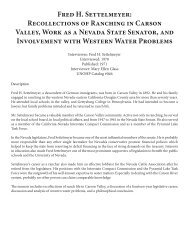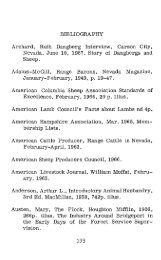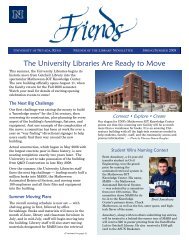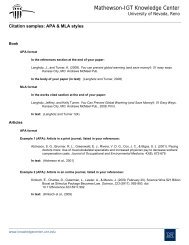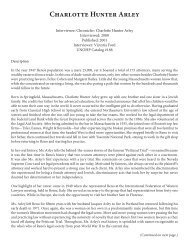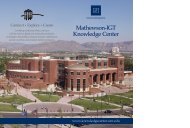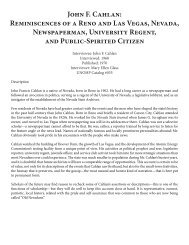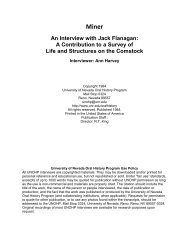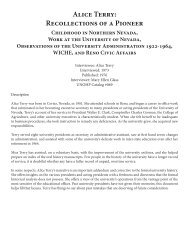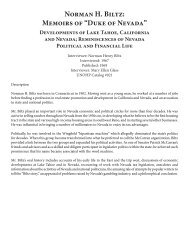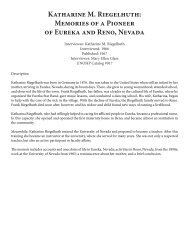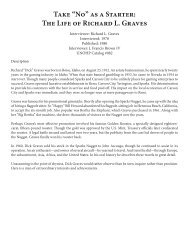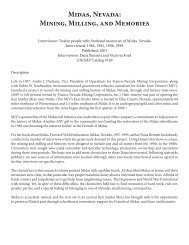Silvio Petricciani - University of Nevada, Reno
Silvio Petricciani - University of Nevada, Reno
Silvio Petricciani - University of Nevada, Reno
Create successful ePaper yourself
Turn your PDF publications into a flip-book with our unique Google optimized e-Paper software.
Introduction<br />
<strong>Silvio</strong> <strong>Petricciani</strong> is a native <strong>Nevada</strong>n, born<br />
in <strong>Reno</strong> on December 1, 1917. His parents,<br />
John and Julia <strong>Petricciani</strong>, had emigrated<br />
to northern California from Livorgno, Italy,<br />
and thence, after a few years, to <strong>Reno</strong>. Soon<br />
after their arrival, John purchased the Palace<br />
Club building on the corner <strong>of</strong> Commercial<br />
Row and Center Street, and obtained a half<br />
interest in the company that furnished slot<br />
machines for the surreptitious gambling<br />
establishments in the <strong>Reno</strong>-Lake Tahoe area.<br />
As the son <strong>of</strong> the “Slot Machine King <strong>of</strong> <strong>Reno</strong>,”<br />
<strong>Silvio</strong> <strong>Petricciani</strong> was introduced at an early<br />
age to the world <strong>of</strong> <strong>Nevada</strong> gambling. His<br />
own, nearly lifelong, activities in the gaming<br />
pr<strong>of</strong>ession began during his high school<br />
years as he assisted his father in maintaining<br />
and repairing slot machines. When casino<br />
gambling was legalized in <strong>Nevada</strong> in 1931,<br />
John <strong>Petricciani</strong> added games to the Palace<br />
Club operation, and after graduating from<br />
high school in 1934, <strong>Silvio</strong> began to work with<br />
his father in the club, learning every facet <strong>of</strong><br />
the business.<br />
World War II interrupted <strong>Petricciani</strong>’s<br />
career and the <strong>Petricciani</strong> family’s operation<br />
<strong>of</strong> the Palace Club. John <strong>Petricciani</strong> was not<br />
well, so the club was leased to others when his<br />
son was drafted into the United States Army<br />
in 1943. Since the lease had not expired when<br />
<strong>Petricciani</strong> returned from Europe two years<br />
later, he involved himself in other activities,<br />
working in various <strong>Reno</strong> area establishments<br />
betore moving to Las Vegas in 1948. During<br />
the subsequent sixteen years, <strong>Petricciani</strong><br />
was associated with four <strong>of</strong> Las Vegas’ major<br />
casinos: the El Dorado, the El Rancho, the<br />
Fremont, and the Stardust.<br />
In 1964, <strong>Silvio</strong> <strong>Petricciani</strong> returned to<br />
<strong>Reno</strong> to resume active management <strong>of</strong> the<br />
Palace Club. Under his guidance, the club<br />
was remodeled and developed into one <strong>of</strong><br />
<strong>Reno</strong>’s most popular small casinos, noted for<br />
its courteous and helpful personnel and its<br />
excellent and inexpensive restaurant. When<br />
Summa Corporation purchased the Palace<br />
Club in 1979, <strong>Reno</strong> lost one <strong>of</strong> its oldest<br />
landmarks in the downtown casino area.



